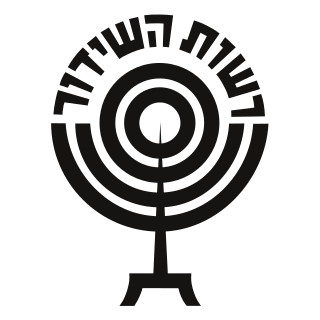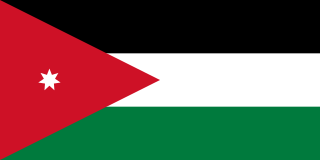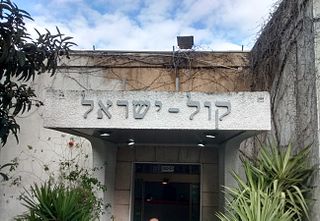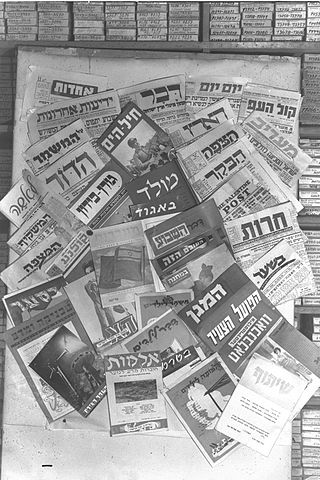The Israeli Declaration of Independence, formally the Declaration of the Establishment of the State of Israel, was proclaimed on 14 May 1948 by David Ben-Gurion, the Executive Head of the World Zionist Organization, Chairman of the Jewish Agency for Palestine, and later first Prime Minister of Israel. It declared the establishment of a Jewish state in Eretz-Israel, to be known as the State of Israel, which would come into effect on termination of the British Mandate at midnight that day. The event is celebrated annually in Israel as Independence Day, a national holiday on 5 Iyar of every year according to the Hebrew calendar.

The Israel Broadcasting Authority was Israel's public broadcaster from 1948 to 2017, succeeded by the Israeli Public Broadcasting Corporation.

The Jordanian administration of the West Bank officially began on 24 April 1950, and ended with the decision to sever ties on 31 July 1988. The period started during the 1948 Arab–Israeli War, when Jordan occupied and subsequently annexed the portion of Mandatory Palestine that became known as the West Bank, including East Jerusalem. The territory remained under Jordanian control until it was occupied by Israel during the 1967 Six Day War and eventually Jordan renounced its claim to the territory in 1988.

Neve Yaakov is an Israeli settlement in East Jerusalem, part of the Israeli-occupied territories, north of the settlement of Pisgat Ze'ev and south of the Palestinian locality of al-Ram. Established in 1924 during the period of the British Mandate, it was depopulated during the 1948 Arab–Israeli War. The area was captured by Israel in the Six-Day War and a new neighborhood was built nearby, at which time international opposition to its legitimacy began. The international community considers Israeli settlements in East Jerusalem illegal under international law, but the Israeli government disputes this, defining it as a neighborhood within the jurisdiction of the Jerusalem Municipality, which provides all services. The population of Neve Yaakov is 23,300. Neve Yaakov is one of the Ring Settlements of East Jerusalem. The settlement is also the location of the IDF's Central Command for the West Bank, Jerusalem, Sharon, Gush Dan and Shephelah.

Kol Yisrael or Kol Israel was Israel's public domestic and international radio service. It operated as a division of the Israel Broadcasting Service from 1951 to 1965, and later the Israel Broadcasting Authority (IBA) from 1965 to 2017. Following the IBA's closure, the radio stations it used to administer are currently operated by the Israeli Public Broadcasting Corporation.

Palestinian Jews or Jewish Palestinians were the Jews who inhabited Palestine prior to the Declaration of the Establishment of the State of Israel on 14 May 1948.

Robert Lachmann was a German ethnomusicologist, polyglot, orientalist and librarian. He was an expert in the musical traditions of the Middle East, a member of the Berlin School of Comparative Musicology and one of its founding fathers. After having been forced to leave Germany under the Nazis in 1935 because of his Jewish background, he emigrated to Palestine and established a rich archive of ethnomusicological recordings for the Hebrew University of Jerusalem.
Israel Radio International or Reka is the radio service of the Israeli Public Broadcasting Corporation (IPBC) for immigrants and listeners abroad.

There are over ten different languages in the Israeli media, with Hebrew as the predominant one. Press in Arabic caters to the Arab citizens of Israel, with readers from areas including those governed by the Palestinian National Authority. During the eighties and nineties, the Israeli press underwent a process of significant change as the media gradually came to be controlled by a limited number of organizations, whereas the papers published by political parties began to disappear. Today, three large, privately owned conglomerates based in Tel Aviv dominate the mass media in Israel.

Yoav Gelber is a professor of history at the University of Haifa, and was formerly a visiting professor at the University of Texas at Austin.
During the 1948 Palestine war in which the State of Israel was established, around 700,000 Palestinian Arabs, or 85% of the total population of the territory Israel captured, were expelled or fled from their homes. The causes of this mass displacement have been a matter of dispute, though today most scholars consider that the majority of Palestinians were directly expelled or else fled due to fear.

During the British rule in Mandatory Palestine, there was civil, political and armed struggle between Palestinian Arabs and the Jewish Yishuv, beginning from the violent spillover of the Franco-Syrian War in 1920 and until the onset of the 1948 Arab–Israeli War. The conflict shifted from sectarian clashes in the 1920s and early 1930s to an armed Arab Revolt against British rule in 1936, armed Jewish Revolt primarily against the British in mid-1940s and finally open war in November 1947 between Arabs and Jews.

The following outline is provided as an overview of and topical guide to Israel:

Jerusalem Calling was the radio station established by the British Mandatory Authority through its broadcasting wing, the Palestine Broadcasting Service. It broadcast in three languages, Arabic, English and Hebrew.

Mandatory Palestine was a geopolitical entity that existed between 1920 and 1948 in the region of Palestine under the terms of the League of Nations Mandate for Palestine.

The All-Palestine Government was established on 22 September 1948, during the 1948 Arab–Israeli War, to govern the Egyptian-controlled territory in Gaza, which Egypt had on the same day declared as the All-Palestine Protectorate. It was confirmed by the Arab League and recognised by six of the then seven Arab League members, with Transjordan being the exception. Though it claimed jurisdiction over the whole of the former Mandatory Palestine, its effective jurisdiction was limited to the All-Palestine Protectorate, which came to be called the Gaza Strip. The President of the protectorate was Hajj Amin al-Husseini, former chairman of the Arab Higher Committee, and the Prime Minister was Ahmed Hilmi Pasha. The legislative body was the All-Palestine National Council.

The Arab Higher Committee or the Higher National Committee was the central political organ of Palestinian Arabs in Mandatory Palestine. It was established on 25 April 1936, on the initiative of Haj Amin al-Husayni, the Grand Mufti of Jerusalem, and comprised the leaders of Palestinian Arab clans and political parties under the mufti's chairmanship. The committee was outlawed by the British Mandatory administration in September 1937 after the assassination of a British official.

Palestinian nationalism is the national movement of the Palestinian people that espouses self-determination and sovereignty over the region of Palestine. Originally formed in the early 20th century in opposition to Zionism, Palestinian nationalism later internationalized and attached itself to other ideologies; it has thus rejected the occupation of the Palestinian territories by the government of Israel since the 1967 Six-Day War. Palestinian nationalists often draw upon broader political traditions in their ideology, such as Arab socialism and ethnic nationalism in the context of Muslim religious nationalism. Related beliefs have shaped the government of Palestine and continue to do so.

Stephan Hanna Stephan (1894–1949), also St H Stephan, was a Palestinian writer, translator and radio broadcaster of history and folklore in Palestine. Besides publishing original articles, travel guides and phrasebooks in English and German, and broadcasting in Arabic, Stephan also produced several translations of books and inscriptions, utilizing his fluency in all these languages, as well as Ottoman Turkish and Syriac. Educated at the Schneller School, a German Protestant orphanage that operated in Jerusalem, he worked for the Mandatory Palestine authorities, first in the Treasury, and then in the Department of Antiquities.
















